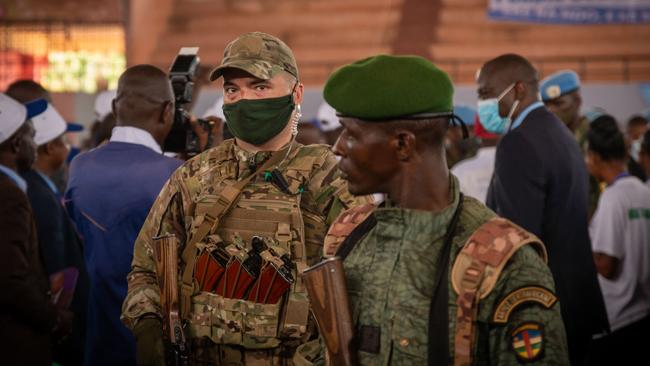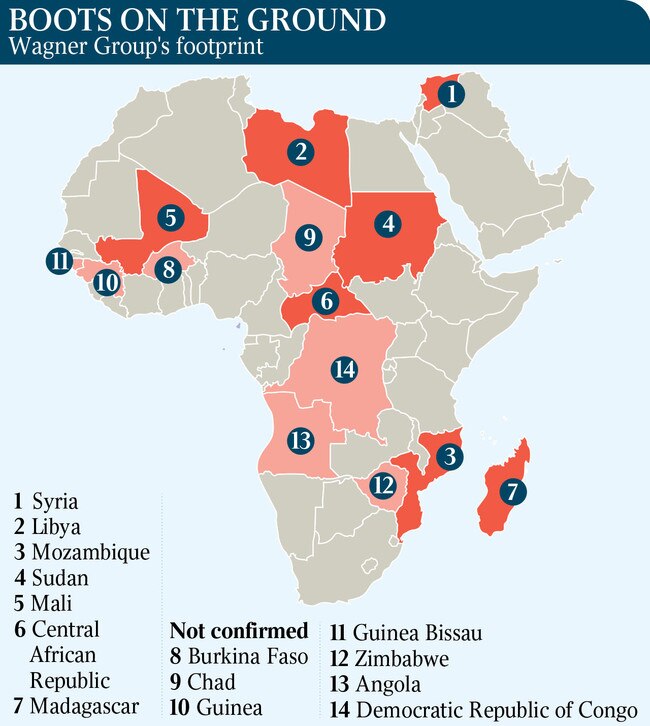Unknown future for Wagner Group in African outposts
Russian mercenary group Wagner has been seen for years as an armed extension of Moscow’s influence in Syria and Africa – a status now called into question.

Russian mercenary group Wagner has been seen for years as an armed extension of Moscow’s influence in Syria and Africa – a status now called into question by its leader’s aborted revolt.
Wagner head Yevgeny Prigozhin might be in exile in Belarus but questions hover over the future of the group’s operations in more far-flung places, where it is said to profit greatly from exploiting natural resources and propping up regimes sceptical of, or hostile towards, the West.
“Wagner has a large presence across Africa, which benefits and depends on the Russian government/military,” Rob Lee of the Foreign Policy Research Institute tweeted. “Would the Kremlin allow the same dynamic to continue if Prigozhin and Wagner are based in Belarus?”
It is a question no one can answer with certainty.

“It’s a mystery, and it depends on how (the Russian authorities) want to compartmentalise what’s going on in Africa and what’s going on everywhere else,” said Michael Shurkin, director of programs for the Africa-focused consulting firm 14 North.
“Russia might think that what they (Wagner) are doing in Africa is worth continuing because it serves Russians interests as well.
“It’s bad news for sure for the Malian and Centrafrican governments. No doubt about that.”
What is likely, however, is that Prigozhin and Vladimir Putin would have raised the subject before agreeing that the mercenary boss would go into exile rather than face charges over the mutiny.
Wagner depends heavily on the Russian defence ministry for deliveries of troops, equipment and weapons to its theatres. And Moscow, for its part, needs Wagner to help keep a grip on the troubled areas where it operates – and where Russia is keen to undermine Western influence.
In Syria, according to the Syrian Observatory for Human Rights, Wagner’s mercenaries – from Russia, former Soviet republics and Syria – acted as “special forces” on the ground alongside Moscow’s regular army after it intervened in the country’s civil war in 2015. They are allegedly still present, in smaller numbers, near oil wells and in the provinces of Hama and Latakia.
In Africa, Wagner fighters have been identified in Libya, Mozambique and Sudan. They are also on the frontlines in insurgency-hit Mali – whose junta insists it employs only “Russian instructors” – as well as in the Central African Republic, where a Wagner executive manages the security of President Faustin Archange Touadera.
The group brings back “gold and minerals from Sudan, the Central African Republic and Mali, which Putin needs to keep his economy on life support”, a European military source said.
The UN’s independent expert on human rights in CAR has accused the army and its Russian allies of atrocities. The EU subsequently imposed fresh sanctions on Wagner, targeting several of its senior representatives there.
What happens next depends on the negotiations between Putin and Prigozhin via Belarus President Alexander Lukashenko.
“Visibly, in Bangui and Bamako, there’s uncertainty and hesitation about what’s happening,” said Maxime Audinet, of the Strategic Research Institute at the Paris Military School in reference to the authorities in CAR and Mali.
“Delegating huge swaths of power to Wagner so it could act where the Russian state didn’t want to get involved has given the group much more room for manoeuvre than planned.
“The Prigozhin network has become the dominant element of Russia’s presence in sub-Saharan Africa in recent years.
“We can expect the fragile balance between Russian state and non-state actors on the continent to be shaken up.”
It could take time for the dust to settle.
“Wagner had a certain amount of freedom in its projects in Africa,” said Pauline Bax, deputy director of the Africa program at the International Crisis Group.
“Unless there’s co-operation with the (Russian) defence ministry, I don’t see how the group can continue to operate there.”
But Putin “can’t send Russian soldiers in Wagner’s place. I can’t see the group pulling out of the continent straight away.”
AFP



To join the conversation, please log in. Don't have an account? Register
Join the conversation, you are commenting as Logout